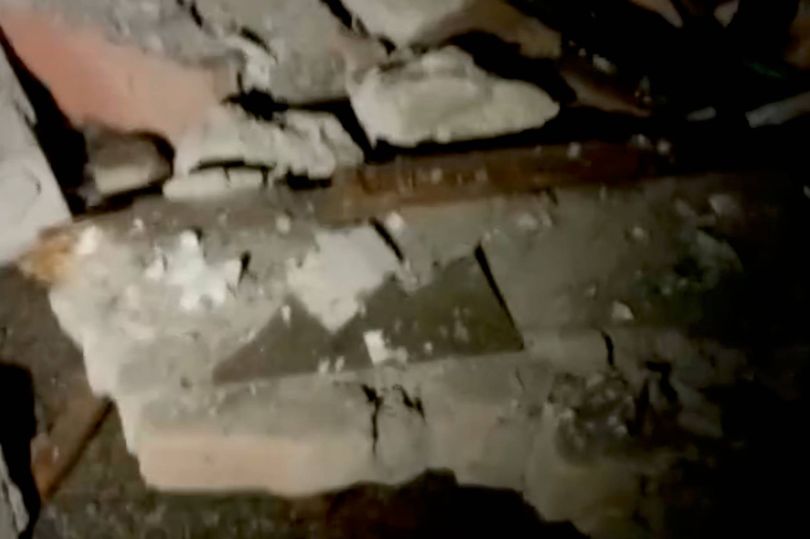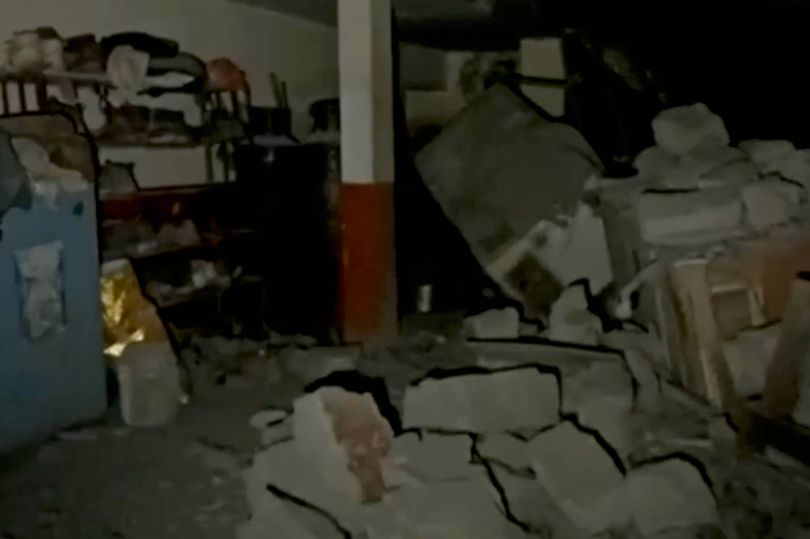Shocking Footage Exposes Devastating Consequences of India’s Strikes on Pakistan

Recently unveiled video by the BBC shows the shocking consequences following the event. India carried out strikes in Pakistan-controlled Kashmir early Wednesday morning. , leading to 13 deaths and 36 injuries, according to reports from Pakistani military officials.
The video, acquired by the Associated Press and filmed in the Muzaffarabad area, shows Pakistani-administered Kashmir , shows the destruction caused by the strikes, with rubble scattered on the ground inside a building and the sound of dripping water, likely from severed water lines.
Even though the video seems to have been recorded inside a structure, it still shows the damage in the nearby vicinity. reports the Irish Star.
READ MORE: The TSA reports that five states will be exempt from requiring REAL IDs after the May 7 deadline.
READ MORE: Embarrassing instance: Secretary of Transportation acknowledges complete lack of knowledge and shifts responsibility onto Pete Hegseth.
Because of extensive power failures in the area, as reported by Pakistani authorities, most of the footage is very dim.
India launched missiles into Pakistani-controlled territory at multiple locations early Wednesday, resulting in at least 13 deaths, including a child, according to Pakistani authorities. India claimed it was targeting infrastructure used by militants.

The strained relations between the two nuclear-capable countries have intensified considerably since the recent assault on visitors in India's part of Kashmir. India alleges that Pakistan backed the militants responsible for the incident, a claim that Islamabad refutes.
Pakistan's Prime Minister Shehbaz Sharif denounced Wednesday's airstrikes, stating that the "deceitful enemy has carried out cowardly attacks" and vowed that his country would retaliate.
"Pakistan has every right to give a robust response to this act of war imposed by India, and a strong response is indeed being given," Sharif proclaimed.
He assertively stated that both his country and military "are well aware of how to handle the adversary."
In response to the tensions, Sharif has arranged for a National Security Council meeting on Wednesday morning.
Missiles were reported to have hit locations in Pakista In administrated Kashmir and within Punjab province, a missile mistakenly hit a mosque in Bahawalpur, leading to the unfortunate demise of a child.
Pakistan's military spokesman, Lt. Gen. Ahmed Sharif, outlined that India initiated assaults on six different locations.
As reported by state-owned Pakistan Television, security sources stated that Pakistan’s Air Force had shot down five Indian aircraft as part of a counterattack; however, additional corroborative information was not promptly provided. At that point, India hadn’t commented on Pakistan’s claim.
The Pakistani Ministry of Foreign Affairs reported that Indian troops commenced the attack without entering Pakistani air space. The strikes also impacted additional areas around Muridke in Punjab province and Kotli in Pakistan-administered Kashmir.
On the Indian side, the military admitted that three civilians were killed as a result of intense shelling from Pakistan into the region of Indian-controlled Kashmir.
In their words , the Pakistani army resorted to indiscriminate shelling across the informal border that divides the disputed territory of Kashmir between the two countries.
On the international scene, the U.S. Secretary of State Marco Rubio posted shared through a publication X He stated, "I am keeping a close watch on the developments between India and Pakistan."
Rubio went on to say: "I echo @POTUS's comments earlier today that this hopefully ends quickly and will continue to engage both Indian and Pakistani leadership towards a peaceful resolution."
Earlier on Tuesday, Trump conveyed his wish that the conflict would end "very quickly" and described it as "a pity."
The embassy of India in Washington disclosed that Ajit Doval, who serves as India's national security advisor, spoke with Rubio immediately following the Indian military actions.
The Embassy stated that India’s actions “were deliberate, accountable, and crafted to avoid escalation. There has been no strike on Pakistani civilians, economy, or military facilities. The only targets engaged were recognized terrorist training centers.”
In Muzaffarabad, local inhabitant Abdul Sammad mentioned witnessing multiple blasts and observed that some individuals had been wounded during the assault. Fear spread as residents fled seeking security, and electricity was instantly disconnected, causing total darkness.
The explosions led to considerable destruction, ripping apart walls. Following the missile strikes, residents assessed the harm done to their houses, navigating through wreckage and remnants.
Fearful of what might come next, people sought refuge in the streets and open areas. "We were afraid the next missile might hit our house," shared Mohammad Ashraf.
Emergency measures have been instituted in medical facilities throughout Pakistan-administered Kashmir.
After the missile attacks, Pakistan ordered closures of educational institutions in Kashmir and Punjab province. In advance of potential assaults, religious seminaries in Kashmir were already closed. India .
The situation has escalated near the Line of Control, which divides Kashmir between India and Pakistan, leading to fierce clashes between the two militaries. According to reports from Indian authorities, there were losses on their side; a woman lost her life and a young girl was wounded as shells and bullets crossed over this well-defended frontier during violent exchanges.
Michael Kugelman, a South Asia expert, conveyed to The Associated Press that the morning's missile strikes from India marked some of the most severe aggression in recent times, predicting that Pakistan's countermeasures would be equally forceful.
As these are two powerful armed forces, despite having nuclear arms as a safeguard, neither hesitates to use significant conventional military power against one another," Kugelman highlighted. "The dangers of escalating tensions are genuine. These risks might amplify rapidly.

No comments